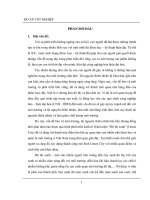Khảo sát hiện trạng phòng ngừa và ứng phó với trầm cảm khi mang thai và sau sinh_Tiếng Anh
Bạn đang xem bản rút gọn của tài liệu. Xem và tải ngay bản đầy đủ của tài liệu tại đây (1.17 MB, 21 trang )
<span class='text_page_counter'>(1)</span><div class='page_container' data-page=1>
<b>Survey on the prevention and response </b>
<b>with depression during pregnancy and </b>
<b>postpartum: WHO? DOING? </b>
MA. Phạm Kiều Linh
</div>
<span class='text_page_counter'>(2)</span><div class='page_container' data-page=2>
Objectives
To overview of supportive programs and
services for women with depression during
pregnancy and postpartum
<sub>To describe the difficulties, barriers of the </sub>
detection, treatments and supporting depression
during pregnancy and postpartum
</div>
<span class='text_page_counter'>(3)</span><div class='page_container' data-page=3>
The framework
The framework is based on:
<sub>Thinking healthy: A manual </sub>
for psychosocial
management of perinatal
depression – WHO 2015
<sub>mhGAP Intervention Guide </sub>
for mental, neurological
</div>
<span class='text_page_counter'>(4)</span><div class='page_container' data-page=4>
Methods
<b>Program overview</b>: synthesis and analysis of
programs of state, private, NGOs about mental
health in general and depression during pregnancy
and postpartum
<b>In-depth interviews: </b> identify the awareness,
favorable factors and difficulties in diagnosis and
treatment depression during pregnancy and
postpartum
</div>
<span class='text_page_counter'>(5)</span><div class='page_container' data-page=5>
Time and location
<b>Time: </b>from June to August, 2017
</div>
<span class='text_page_counter'>(6)</span><div class='page_container' data-page=6>
Sample size
- 05 community intervention models for mental health/
depression and depression during pregnancy and
postpartum
- 24 indepth interviews:
05 managers/ leaders and obstetricians
05 doctors and specialists in mental health,
depression
04 experts, counselors, psychological support
staffs for women (including depressed women)
</div>
<span class='text_page_counter'>(7)</span><div class='page_container' data-page=7>
Result 1: Services/ Supports
Support
groups (online/
community)
Pediatrician
Psychiatrist
</div>
<span class='text_page_counter'>(8)</span><div class='page_container' data-page=8>
Result 2: The factors affecting access to
services/ supports
<b>2.1. Lack of knowledge of pregnant/ postpartum women: </b>
◦ Most do not know about depression during pregnancy
and postpartum before pregnancy or childbirth
◦ Only examine when there are “heavy expressions”:
looking lost/ dull, gawk, can not eating/ sleeping, serious
conflicts with family members, hurt the baby (dropping
the baby, think of killing the baby...)
</div>
<span class='text_page_counter'>(9)</span><div class='page_container' data-page=9>
"I took my baby to meet the pediatrician. I told to her
that I can not sleep, I afraid of my baby dies, I always
miscellaneously said such as “You (my husband) do
not go to work, please. If not, you never see our baby.
The pediatrician advised me to visit the doctor… She
said that I should go to the Chau Quy hospital. When I
and my husband went to the Chau Quy hospital, we
were scared. So my husband took me to come in the
neurological department of Bach Mai Hospital. Here
the doctor gave me the prescription for a month but not
useless. I still can not sleep, so I went back to the
neurological department. Then the doctor introduced to
the Bach Mai mental hospital"
</div>
<span class='text_page_counter'>(10)</span><div class='page_container' data-page=10>
Result 2: The factors affecting access to
services/ supports (cont.)
<b>2.2. Gender, social prejudices </b>
- Non-acceptance “There is the depression in the
pregnancy and postpartum periods”; thinking that
“abnormal temperament”; “the coddle”,
“idleness”…, expressing: the uncomfortable
attiudes, the neglect, the scolding…
- Complexity/ prejudices with “mental”
non-examination even when the doctor assigns that
going to see the psychiatrist
- “The dependence” of the postnatal woman: must
</div>
<span class='text_page_counter'>(11)</span><div class='page_container' data-page=11>
<i>“I'm afraid to go to the hospital or medical </i>
<i>facilities, because people think that I'm </i>
<i>crazy” </i>
<i><b>(Female, 28 years old, the second </b></i>
<i><b>pregnancy and self-doubt with </b></i>
<i><b>“depression”) </b></i>
<i>“I told my husband: ‘How do I do? I don’t know </i>
<i>what is going on? What do I have problems? I </i>
<i>hate our baby’. But my husband said that ‘Are you </i>
<i>crazy? If you are crazy, you must be exam. But you </i>
<i>are ok, I will help you to do housework”</i>
</div>
<span class='text_page_counter'>(12)</span><div class='page_container' data-page=12>
I have ever met a case that her husband and all of
family members did not believe what she said. I
called directly her mother but she was cursing me
badly. I brought the materials to her husband but
he did not believe me. He also was cursing me
crazy and threatening to hit me ...She had a
headache, so her husband took her to exam. She
told to the doctor about her expressions. The
doctor referred to the neurologist and explained
to her husband. Then her husband believed and
help her treatment at home.
</div>
<span class='text_page_counter'>(13)</span><div class='page_container' data-page=13>
Result 2: The factors affecting access to
services/ supports (cont.)
<b>2.3. Lack of sensitivity, </b>
<b>attention </b> <b>of </b> <b></b>
<b>non-psychiatric health staffs </b>
Training time in mental
health is very short while
the ability to interact with
patients who are with
mental health problems is
very high -> Most of
doctors lack of
knowledge, or sensitivity
to postpartum depression.
I still tell my students that not
all of them are working in
psychiatry. But most of them
will contact with the patients
with mental health problems.
Currently the 4-weeks mental
training program for general
practitioners has been reduced
to 2 weeks. 40 questionnaires
have been reduced to 17.
While about 30-35% of the
population have been mental
health problems.
</div>
<span class='text_page_counter'>(14)</span><div class='page_container' data-page=14>
When I had a pregnancy
checkup, I talked to the
doctor that I worried very
much, I was afraid of the
development of the fetus
was not good. And why I
did not love the baby like
other mothers? The doctor
said that: Why worry?
Making some more tests to
spend money.
<i><b>(Female, 25 years old, the </b></i>
<i><b>first pregnancy and </b></i>
<i><b>self-doubt with ‘depression’)</b></i>
I have ever met a lot of
cases that patients said
that they had stomach
pain, had several times
colonoscopy without
detecting physical injury.
But they still be treated
stomach pain in a year.
When they came to me, I
find out a mental problem.
If the doctor is concerned
to mental health, it's not
hard to find out.
</div>
<span class='text_page_counter'>(15)</span><div class='page_container' data-page=15>
Result 2: The factors affecting access to
services/ supports (cont.)
<b>2.4. Judge, blame, lack of sensitivity of health staffs</b>
When we find out the serious stress cases, we transfer our
clients to Bach Mai Hospital. However, there is one of
case that the client go to the hospital and do not want to
return there, because she feels uncomfortable, judged and
blamed from the doctor. So we find out the other doctor
whom we know and trust and we took her to
re-examination with that new doctor. What a surprise, that
new doctor is the one who makes the client uncomfortable.
</div>
<span class='text_page_counter'>(16)</span><div class='page_container' data-page=16>
Result 3
. Review the policies
<i><b>3.1. Mental health is generally placed in the broad </b></i>
<i><b>sense of health, it is not mentioned separately. But </b></i>
<i><b>the aspects “mental" and "happiness" are defined </b></i>
<i><b>in the National Law and Strategy on health </b></i>
<i><b>Constitution </b></i>
Everyone is entitled to health care and protection, is
equally entitled to medical services and has the duty
to comply with regulations with regard to
prophylaxis, medical examination and treatment.
</div>
<span class='text_page_counter'>(17)</span><div class='page_container' data-page=17>
Result 3. Review the policies (cont.)
<b>Law on the protection of people’s health </b>
<i><b>Health</b></i> <i>is the most precious asset of man, one of the </i>
<i>basic things for people to <b>live happily</b>, is the goal and </i>
<i>an important factor in economic, cultural, social </i>
<i>development and in national defense <b>(Suggestions) </b></i>
</div>
<span class='text_page_counter'>(18)</span><div class='page_container' data-page=18>
Result 3. Review the policies (cont.)
<b>National Strategy for protection, care and </b>
<b>promotion of the people’s health 2011-2020 and </b>
<b>vision 2030 </b>
<i>“To ensure that all of people receive primary </i>
<i>health care services, extending access to and using </i>
<i>quality health services. People live in safe </i>
</div>
<span class='text_page_counter'>(19)</span><div class='page_container' data-page=19>
Result 3. Review the policies (cont.)
<b>3.2. The terms "depression during pregnancy/ postpartum depression" </b>
<b>have not been mentioned formally in the National Guidelines on </b>
<b>Reproductive Health Services; however, depression, mental illness, </b>
<b>observe mental manifestations, mental health care have been mentioned </b>
<b>in the antenatal and postnatal examinations. </b>
<b>Counseling caring before pregnancy: </b>Encourage the health examination
of wife and husband to detect chronic diseases, including mental
disorders
<b>9 steps in pregnancy checkups: </b>there is a mention of a history of mental
illness
<b>Counseling for pregnancy women: </b> “avoiding stress”, “roles and
responsibilities of the husband and other family members
<b>Counseling in labor and postpartum: </b> mobilizing and psychological
support
<b>Caring of mother and newborn in the first week after childbirth: </b>
</div>
<span class='text_page_counter'>(20)</span><div class='page_container' data-page=20>
Recommendations
Raising awareness, reducing the stigma and
prejudice of the community for pregnancy/
postpartum depression and mental health
<sub>The pregnancy/ postpartum woman need to </sub>
screening and detection of depression – from
personal level to family, community, health
facilities levels
</div>
<span class='text_page_counter'>(21)</span><div class='page_container' data-page=21>
<b>Thank you! </b>
</div>
<!--links-->









